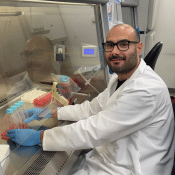Researcher Spotlight: Pantaleo De Simone, MD
columbia university irving medical center

Diffuse large B-cell lymphoma (DLBCL) is an aggressive and often incurable form of lymphoma. An improved understanding of DLBCL biology is needed to identify potential treatment strategies, and Dr. De Simone’s research aims to uncover novel targets in this disease. “We have recently discovered a new way whereby errors in specific DNA regions called super-enhancers (SEs), which control the expression of important genes, hijack fundamental activities of normal cells and favor their malignant transformation,” he explains. “The goal of my project is to study how highly frequent DNA errors in the SE of the BTG2 gene derail its function, with the potential to reveal novel mechanisms of lymphoma development and new potential targets for therapy.”
Dr. De Simone’s interest in oncology and hematology began early in his medical career, when he was completing his medical training at San Raffaele University School of Medicine in Milan, Italy. “When I first saw blood cells under a microscope, I was immediately fascinated by the complexity and beauty of the hematopoietic system,” he says. “From that moment on, the desire to better understand the mechanisms that regulate this delicate system was the driving force for my subsequent choices and brought me to enroll in the residency program in hematology at the University of Milan.” It was during those years when he became drawn to a career in lymphoma research, which led him to his current position as a postdoctoral research scientist studying the molecular genetics of lymphoma at Columbia University Irving Medical Center in New York.
“Research on lymphomas has seen an unprecedented acceleration in recent years,” Dr. De Simone says. “I am still convinced, however, that many aspects of lymphoma genetics have yet to be uncovered, including new mechanisms that regulate the expression of important genes that ultimately lead to lymphomagenesis. Understanding these mechanisms could represent a good opportunity to advance the diagnosis and treatment of lymphoma.” With the support of the Foundation’s Postdoctoral Fellowship Grant, Dr. De Simone is hopeful that
his research will reveal new opportunities to understand the pathogenesis, diagnosis, and treatment of DLBCL.
